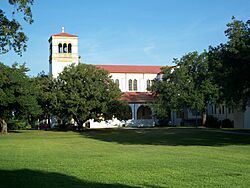Saint Leo Abbey facts for kids
 |
|
| Monastery information | |
|---|---|
| Order | Benedictines |
| Established | June 1889 |
| Mother house | St. Vincent Archabbey |
| Diocese | Saint Petersburg |
| Controlled churches | Church of the Holy Cross |
| People | |
| Abbot | Vacant |
| Prior | Br. Apollo Rodriguez, O.S.B. |
| Bishop | Most Rev. Gregory Parkes |
| Architecture | |
| Status | active |
| Heritage designation | National Register of Historic Places |
| Designated date | January 7, 1998 |
| Architect | Frank Parziole |
| Style | Italian Romanesque |
| Groundbreaking | September 19, 1936 |
| Site | |
| Location | Pasco County, Florida; St. Leo, Florida |
| Coordinates | 28°20′14″N 82°15′36″W / 28.33722°N 82.26000°W |
|
Saint Leo Abbey
|
|
| Area | 100 acres (0.40 km2) |
|---|---|
| NRHP reference No. | 97001637 |
| Added to NRHP | January 7, 1998 |
Saint Leo Abbey is a special place where Benedictine monks live and pray. It is a monastery located in Saint Leo, Florida, in the United States. The monks here are part of a larger group called the American-Cassinese Benedictine Congregation.
Contents
History of Saint Leo Abbey
The story of Saint Leo Abbey began in 1882. That's when Judge Edmund F. Dunne started a Catholic community in San Antonio, Florida. In 1886, Father Gerard Pilz, a Benedictine monk, arrived. He was the first Benedictine in Florida. He came because the local bishop wanted a German-speaking priest for the German families moving to the area.
In 1888, another Benedictine monastery took over the work in the colony. Then, in February 1889, Benedictine nuns arrived from Pennsylvania. They started their own monastery called Holy Name Monastery.
Founding the Abbey and University
Abbot Leo Haid helped set up Saint Leo College, which is now Saint Leo University. On June 4, 1889, both Saint Leo College and the Benedictine mission were officially started. Judge Dunne gave the land to the Benedictine Order for this purpose. The mission became an independent priory in 1894. Later, on September 25, 1902, Pope Leo XIII made it an official abbey.
Monks Serving Communities
The monks at Saint Leo Abbey did more than just serve their own community. They also helped start Catholic churches in many nearby towns. These included Dade City, Zephyrhills, and New Port Richey. They even helped establish churches in places as far away as New York and Cuba. For many years, Saint Leo Benedictine monks served churches throughout Florida. They also sent missionaries to Argentina in the late 1900s. The monks continued to provide priests for churches in Pasco, Hernando, and Citrus counties until the late 1990s.
Saint Leo University's Journey
On June 4, 1889, the Florida government approved the plan for the Benedictine monks to build a school. This school grew into Saint Leo University. In 1969, the Benedictines handed over control of the University to an independent board.
The Church of the Holy Cross
In 1935, Abbot Francis Sadlier decided to build a new church for the abbey. A Tampa architect named Frank Parziole designed the church. He used a style called Romanesque, which is known for its round arches and strong walls. The Church of the Holy Cross was officially dedicated on January 29, 1948. In 1998, it became part of the National Register of Historic Places.
Saint Leo Abbey Historic District
On January 7, 1998, the area around Saint Leo Abbey was added to the National Register of Historic Places. This means it's a special place with important historical buildings. The district is located in St. Leo, Florida, on the campus of Saint Leo University. It covers about 100 acres and includes three historic buildings.
Leaders of Saint Leo Abbey
Here are the Abbots who have led Saint Leo Abbey over the years:
| Charles Mohr, O.S.B. | 1902 – 1931 |
| Francis Sadlier, O.S.B. | 1929 – 1954 |
| Marion Bowman, O.S.B. | 1954 – 1969 |
| Fidelis Dunlap, O.S.B. | 1970 – 1985 |
| Patrick Shelton, O.S.B. | 1985 – 1996 |
| several administrators | 1996 – 2007 |
| Isaac Camacho, O.S.B. | 2007 – 2025 |
Life at the Abbey Today
As of 2019, the monks at Saint Leo Abbey come from all over the United States. Their ages range from 23 to 74 years old. They continue their life of prayer and community service.
Gallery
See also
 In Spanish: Abadía de San León para niños
In Spanish: Abadía de San León para niños









